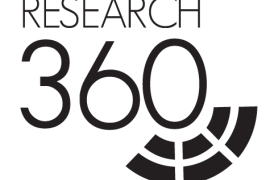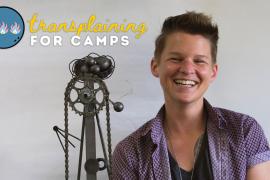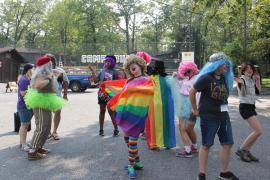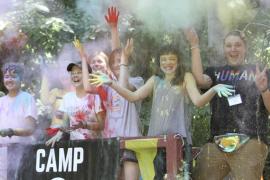ACA: What is the mission of Camp Fire Green Country? Can you tell us more about who Camp Fire is?
Meier: The statement of inclusion is “Camp Fire believes in the dignity and the intrinsic worth of every human being. We welcome, affirm, and support young people and adults of all abilities and disabilities, experiences, races, ethnicities, socioeconomic backgrounds, sexual orientations, gender identities and expressions, religion and non-religion, citizenship and immigration status, and any other category people use to define themselves or others. We strive to create safe and inclusive environments that celebrate diversity and foster positive relationships.”
We are an SEL [social-emotional learning] organization. Our focus is working with kids and youth on social-emotional learning and developing positive relationships.
ACA: Can you tell me more about Tulsa Camp Fire and the programs you offer? What about the campers you serve?
Meier: Currently, we offer four one-week sessions. We offer two specialty population sessions, and our last two sessions are open to anyone who wants to come.
The first session we’ve been offering for 15–20 years now, and it is a gluten-free session for kids who have Celiac disease or are gluten intolerant. One comment that always sticks with me that a parent told me a couple years ago was they were just so happy about the session because it’s a week where their kid doesn’t have to feel like an “other than.” I’ve worked at camps where we had accommodations for youth, but that didn’t always mean that they could be a part of everything.
It sounds easy, just food — but it’s such a big part, and mealtime can be that community time where everybody can be together, they can talk about their day, get to know each other better, and if you can’t be a part of that mealtime then you miss out on that part of camp. So having that session is fantastic.
Our next one is our LGBTQ+ session. This is for any youth who identifies anywhere on the LGBTQ+ spectrum and siblings, allies, and anyone who wants to come. That’s the focus, and it is basically just providing a positive environment for them to come be themselves and hang out and have a positive camp experience.
Our last two weeks are two one-week sessions that are open to anyone who wants to come. Since we started offering the LGBTQ+ session it has informed and changed a little bit of how we run all our sessions in terms of accommodating youth. So all of our sessions provide space for youth to attend no matter how they identify.
ACA: There are many ways that an organization can advance diversity, equity, and inclusion (DEI), and this work is so vast. Can you explain how Camp Fire is focusing on DEI and how it relates to that special population?
Meier: Our DEI work was happening way before we ever had a LGBTQ+ session at camp, and it came primarily out of a relationship with another organization that works almost exclusively with LGBTQ+ youth and provides a wide array of services for them beyond what we do. We had a partnership that was part of a joint grant between the two organizations in that we were both working with the same population but in different capacities, so that’s where our step into that field came initially. It also determined that we have a permanent DEI position within the organization to manage that partnership and the youth we work with there, but then also to look at our organization as a whole and look at what we’re doing in all our programs.
As we continue to grow, we’re always asking where we are, what the barriers are that we have in terms of access to our programs, and then also what barriers are keeping us from getting into different communities.
As you begin to dig deeper into this work you uncover a bunch of other areas that you need to address within your organization, and as we do that, it’s like how can we engage with our community? How can we engage with more youth and continue? I don’t think we’ve ever pulled back from something we’ve uncovered and said, “We can’t do this.” It’s “how do we do this?”
ACA: This work is never-ending. There’s always going to be something to uncover that needs worked on. And we’re here to celebrate your story and the excellent work you’ve been doing at Tulsa Camp Fire with the LGBTQ+ community. I want to get into that history and that background to give folks a little more of that well-rounded history that camps are out there doing this specific work but acknowledging that there’s always more work to be done and that this work is challenging, so thank you for that vulnerability.
Meier: Along those lines, the very first year we offered a LGBTQ+ session, we said let’s degenderize all the restroom facilities, all the shower houses, and we’ll make it all gender neutral. And we thought that was a big step — and that was just the first step. As the years go by, we learn volumes each session. As this work grows outside our organization, we learn lessons from other camps and organizations and apply those to us and our families and youth that we work with. Every year we’re adjusting something even a little bit to make the experience more seamless and more rich.
ACA: Was there a certain memory or moment you have in your career that you can share that was part of this mission?
Meier: In 2018 when I started with Camp Fire Green Country, as part of my onboarding process, I talked with everyone in the organization. It was the previous DEI coordinator’s last day while it was my first day, so I talked to them about all their work as they were packing up their belongings. I asked them what I could do to better support the youth they’d been working with in my capacity and my role.
The answer sticks with me as though it was yesterday. “Create a session for LGBTQ+ youth.” My response in my mind was “I don’t know how to do that” but the words that came out were “I can do that” because I’m the camp director. That’s my role, and I knew we had a spot on our calendar that it could be a possibility. My initial reaction was OK, I can do that, and then we started putting the plans in motion to make that happen.
That first year we started small. We started with I think only 20 to 30 youth that first year and we did a short session — three days, two nights. We wanted to see if there was interest. We also wanted to make sure we had systems in place in terms of housing and making sure facilities were made gender inclusive and then go from there.
Most of the youth we had that first session were already involved with our organization through other programs we had at the time. We learned volumes in that first few days we had. From there we decided next year we would offer a full session, and since then it has grown into where we’ve had to put waitlist on the session and we’ve had people come from very far away to be part of the program.
ACA: For camps who are beginning to do the work of DEI who maybe don’t know where to start, what advice would you give them?
Meier: Start with yes, and say yes to as many things as possible, because it forces you to back it up and go for it. I think when you say “yes, but” you start allowing yourself an out.
For a lot of camp directors, I’ve heard, there’s fear of losing current families or clients. I think a lot of the fear is just “am I going to get it right? I’m afraid I’m not going to get it right.” To that I would say reach out and talk to as many people as you can. We were very fortunate that we had a DEI coordinator on site with us. We had experience running weekend retreats and for queer youth, so we already had systems in place. It was moving those from a short stay to a whole session and then figuring out how to staff, how to do housing, how to do all the details we needed to do.
Reach out and talk to your peers. Any time I’ve had a question there’s about five different camps I’ve sent emails out to saying “I know you’ve been doing this. How did you approach this?” and then taking that information and adapting it to what works for us. I would just say acknowledge the fear that’s there but know there’s going to be people there to support, so don’t be afraid to reach out.
ACA: Can you talk about the foundation that changed when transitioning to include and LGBTQ+ camp session, and what shifted to make the camp a safe space for queer youth?
Meier: The foundation is the workings every camp has like housing, food, where people shower, how the transition between activities happens, things like that.
What gave me the greatest anxiety starting off was doing gender-inclusive housing. Dor other sessions we go from everybody is put in a cabin by gender first then by age. I know a lot of other camps operate that same way with putting kids in cabins. With our LGBTQ+ session it was removing gender and just going by age. Having never done that, it’s nerve-wracking, but we had a staff member who had done it before that was holding my hand through the process saying it was going to be OK.
So that’s the way we’ve stuck with it. We have rules. With our youth, we let them set cultural boundaries and rules and have a voice in that, but then there are hard rules that they have to abide by for us to be able to do this. Respecting everybody’s space is so important. The simple rule is “one bunk, one butt.” Nobody’s allowed in anybody else’s bunk. We have common areas where they can hang out together, but everyone has to respect everybody else’s space and privacy in that space.
We take away any gender identifying signs around the camp. For an LGBTQ+ session we make signs, and they’re usually big colorful signs that are inclusive. Instead of male/female, girls/boys, signs are “y’all” or “everyone” and they’re big and bright and colorful so everyone knows and understands everything is open to everybody.
ACA: How long would you say it took you to figure out housing and to communicate with your families and your staff? What’s the timeline it would take a camp to have that set up?
A lot of things have to happen as to how people enter into our system. We’ve transitioned all our registration materials so for the LGBTQ+ session there is no gender listed. We use an in-house registration system that’s online but we manage it, so it was easy for us. Some registrations have gender identity and you check a box, boy or girl. We switched ours from checking a box to writing in whatever you choose. So people can put trans girl, trans boy, whatever gender they’re identifying as during their time at camp. This is a simple change that can be done now for next summer.
ACA: How do you help educate parents about your program when you are accepting campers all over the country?
Meier: In the beginning, if somebody signed their youth up for our LGBTQ+ session, I had a standard letter that talked about things that were specific to that session and would send that to parents as soon as they registered. If they had any questions, they could call me. The first couple of years we were working with families and youth who were already involved in our programs or not too far removed from us geographically. The last two years we’ve had kids from all over the country, so this last year we started doing Zoom call information sessions where I could talk about our session and our history and open it up to parents to ask questions they have. I think having those information sessions is something that will stick and we’ll continue to do that going forward. It may even bleed over into our other sessions as well as we go forward.
ACA: Do you think that might ease some of the first-day jitters by having those information sessions just by having caregivers see face to face who their campers are going to see on the first day of camp?
Meier: I talk a little about the anxiety the LGBTQ+ youth are experiencing on a daily basis and trying to navigate new environments and not being aware what they’re going into, so I think to have that information up front and to know going in the first day all the restrooms are going to be degendered so they don’t have to worry about that. They know going into their cabin what to expect when they walk in — it’s going to be a bunch of youth the same age as me with all sorts of different identities, so I know what that’s going to look like. It takes away that initial anxiety. It also takes away the anxiety from the parents of knowing that you have people who are going to be caring for your child that have put a lot of thought into that program and the experience they’re going to have.
ACA: What are some ways you navigate the staffing crisis while serving a specific population? Do you have any additional advice for working with staff who identify as LGBTQ?
Being in Oklahoma, with a lot of the rhetoric being tossed around right now, that was one of the concerns in the back of my mind. Even in a good time staffing can be challenging. For me, there was anxiety around staffing. Am I going to be able to find the right people? Where am I going to find these people?
Where we’ve gotten staff and how we approach that is being very open and honest about who we are, the youth that we serve, and what we’re looking for has done well. While I know it’s not easy to find good people, I don’t think it’s been any more difficult for us than it has any other year.
I think by sticking with our mission and accepting staff the same way we accept campers, the same way I think a lot of directors are afraid they’re going to hurt their population or enrollment — by offering this they’re afraid they’re going to lose staff or not going to be able to get staff. Both of those are not true. If I lost somebody because we offered this program or session, I would question if they were here for the mission or some other reason. Because of the kids we work with, I need people to be mission focused.
We offer and create an environment that is accepting and affirming at the staff level so we can then do that for the youth as well. I think that’s key for us — our mission statement is to create that affirming place for positive relationships to develop, and so we start with the staff and if we do that, it trickles down to the youth, and the staff get this is what we’re helping the kids to experience as well.
Interview conducted by Alicia Danenberg, ACA content director. This interview has been condensed and edited for clarity.
Eric Meier, MPA, is the director of camps and outdoor programs for Camp Fire Green Country. You can reach Eric at [email protected].
The views and opinions expressed by contributors are their own and do not necessarily reflect the views of the American Camp Association or ACA employees.




